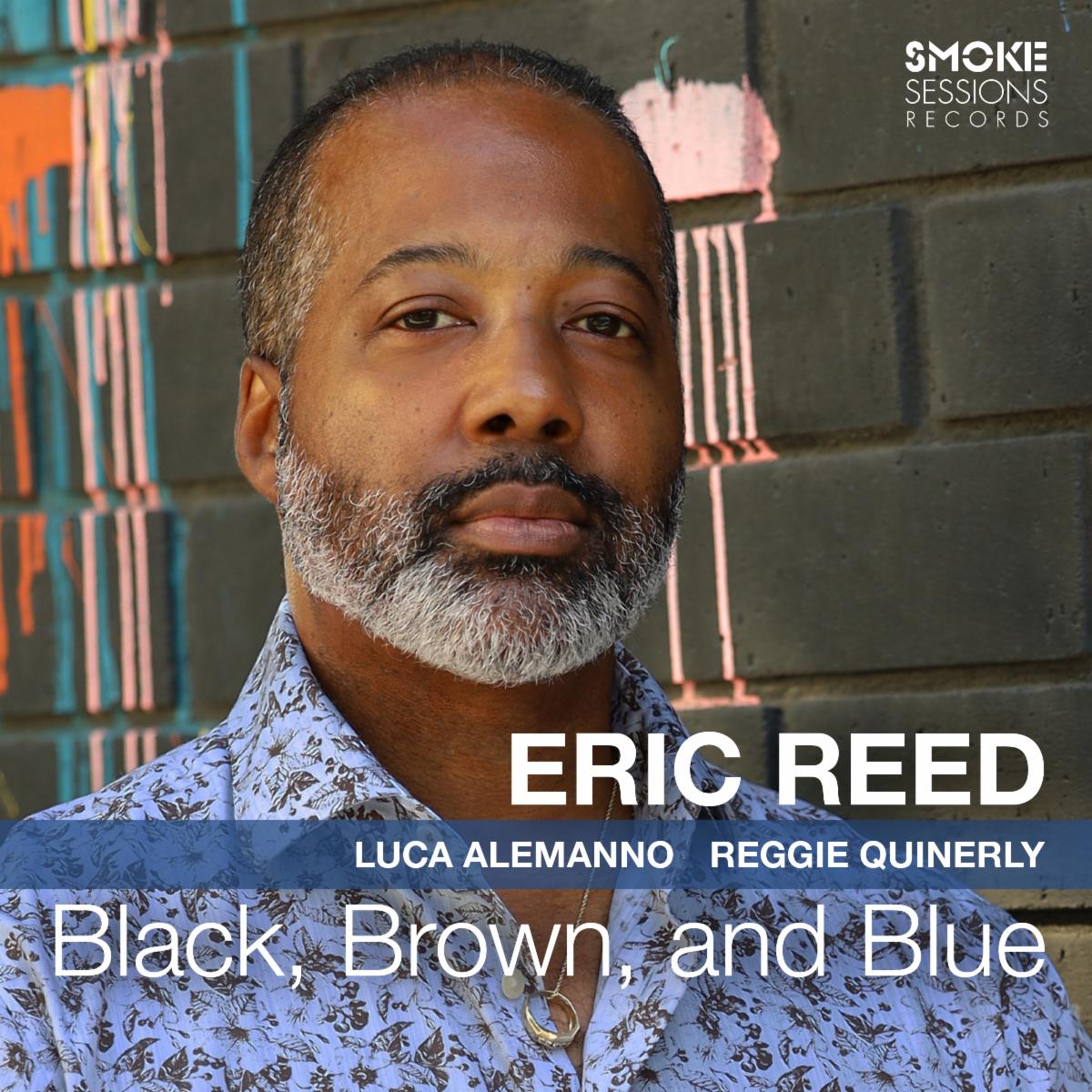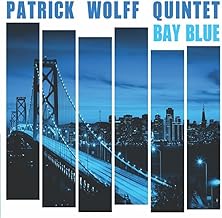
Early last month, pianist Eric Reed released his latest album, Black, Brown, and Blue through Smoke Sessions Records. The 13-song collection is an intriguing presentation that is worth hearing at least once. That is due in part to its featured covers, which will be discussed shortly. While the covers that make up the set’s main body are collectively of interest, the liner notes that accompany the collection are certain to generate their own share of discussion. They will be discussed a little later. The songs’ sequencing rounds out its most important elements and will also be examined later. Each item noted here is important in its own way to the whole of the recording. All things considered they make Black, Brown, and Blue quite the intriguing presentation that is an interesting addition to this year’s field of new compilations and that deserves to be heard at least once.
Black, Brown, and Blue, the latest studio recording from Eric Reed, is an intriguing presentation from the veteran pianist. Its interest comes in part through its featured covers. The covers are of well-known works of jazz and R&B from artists who are just as well-known for the most part. That includes the likes of a cover of Stevie Wonder’s ‘Pastime Paradise,’ ‘Bill Withers’ equally beloved and timeless song ‘Lean on Me’ and Horace Silver’s ‘Peace’ alongside Wayne Shorter’s ‘Infant Eyes,’ Duke Ellington’s ‘I Got It Bad (and That Ain’t Good),’ and Thelonious Monk’s ‘Ugly Beauty’ just to name a handful of the acts and songs included in this set. Withers’ ‘Lean on Me’ is perhaps the most iconic of the songs included in this collection. The song, which is itself driven by its piano arrangement in the original song leans on a certain gospel influence and some equally subtle R&B touch for its body. Reed takes that gospel influence a step farther giving it even more presence in his take while vocalist Calvin B. Rhone enriches that presentation even more through his soulful vocal delivery style. This enhanced gospel influence makes sense, as Reed points out in the record’s liner notes, the role of churches (where gospel is played) in the Black community. It makes the already timeless tune all the more engaging and entertaining in its presentation here.
The take that Reed and his fellow musicians – Luca Alemanno (bass) and Reggie Quinnerly (drums) – put on ‘Infant Eyes’ is interesting in its own right. The gentle, flowing blues arrangement that the trio presents here is a prime example of the old adage that less really is more. The steady, light time keeping from Quinnerly and the equally subtle bass line from Alemanno pair so well with the equally light tones from Reed, with the result of the group’s work being so immersive. Reed and company step up Shorter’s much slower original here and give it more of a bluesy approach in this outing. It is a distinct change of style and sound this time out. That bluesy approach continues to add to the focus on the blues that Reed mentions throughout his liner notes and makes for its own engagement in this case, too.
Reed and his fellow musicians stay largely true to their take of Horce Silver’s ‘Peace,’ too, all while removing the trumpet that formed the arrangement’s base in its original presentation. The same cool jazz approach taken in the original is just as present here, making it just as engaging and entertaining in its simplicity as so many of the other songs featured in Reed’s new record. What is really interesting about the trio’s take of ‘Peace’ is what Reed had to say in his liner notes about the song in comparison to his own mindset about the world.
He said of the two interrelated items, “I find myself angrier and angrier at humanity with every passing week. People wish for world peace – they can forget it; We’ll never see it – not as long as almost half of the global household wealth is controlled by 1.2 percent of the worlds’ population and religious zealots continue to fuel hate; these are the entities that bolster racism.” Putting his comments into full context, he was discussing how Silver composed ‘Peace’ during times of anything but peace in the United States and the role that the nation’s state played into the song’s creation versus his own thoughts on where the country is today. It is clear, to that end, to see why Reed and company added this song to the collection. It is a show of respect for Silver. In the same fashion the other songs are displays of respect for the other figures whose work is covered here.
Staying on that topic of Reed honoring the legacy of all the musicians and work featured here, he points out in the closing lines of his notes that he chose to make this compilation because in his mind there is “a general lack of true appreciation of Black culture.” This statement and so many others that he makes throughout the compilation’s liner notes complicate the engagement and entertainment ensured by the featured songs. That is because his comments overall are so divisive. If there is such a lack of support for Black culture in America today, then why is there clearly an effort nationwide to celebrate Black culture through festivals, through books, and even movies celebrating the African Americans who have made such key contributions to this nation, its overall culture and history? As a matter of fact, there is a book titled The Chitlin Circuit and the Road to Rock ‘n Roll – authored by Preston Lauterbach that opens celebrates the rich roots of rock and roll in the blues music crafted by African Americans in the early 20th Century and played at the juke joints along the well-known “Chitlin Circuit”. The book is well worth the read by anyone wanting to learn more about the history of black culture and its impact on modern music.
Reed also argues in his notes that today’s music composed by African Americans should serve them and their culture “and not just as fodder for pop culture.” He argues music made by African Americans has moved “closed to Whiteness because that’s what wealth looks and smells like. And the closer we get to it, the further they keep moving the goal post.” If that is not divisive music, it is unclear what is. These comments are important because they are in themselves racist comments, considering that he has included in this record a song that is based in black culture in ‘Lean On Me’ and that yet has become a pop culture staple. On the same note, the inclusion of Stevie Wonder’s ‘Pastime Paradise,’ which itself became the basis for Coolio’s ‘Gangsta’s Paradise’ was in itself written to make money. Stevie Wonder will made multiple songs throughout his career that played and continue to play an integral part of Black life and culture. The same can be said of Silver’s ‘Peace.’ It clearly is another integral statement about what African Americans went through during the Civil Rights era. So for him to say that music of the Black community has grown away from that and become “white” is itself close minded and divisive. Yes, racism is sadly alive and so prominent even today in America. The thing of it is though, that there are efforts on both sides to combat it, including through music. To that end, Reed’s comments here are not the best for him to have made.
He does close out – somewhat – by pointing out that we should celebrate the contributions of all people to the music world, but again, following that up by arguing there is that alleged lack of true appreciation for Black culture in America is counterintuitive. Overall, the comments that Reed makes throughout the liner notes are insightful. There is no denying that. However, they are also very divisive, at points. To that end, the liner notes are interesting to read but also create a slight problem for the collection’s appeal. They paint Reed as someone who created this collection more out of personal frustrations and anger than out of true desire to pay respect to musicians and composers who have in fact been receiving honor and tributes for a long time.
Understanding that the liner notes featured in this recording are certain to create plenty of discussion among audiences, but not enough to doom the presentation, there is one more item to note. That item is the record’s sequencing. Throughout the course of the record’s 67-minute run time, the mood is calm and subdued, save for the opener/title track (which is also the record’s only original song). From there, the songs remain relatively slow and subdued, just as different levels. The overall sense generated through the songs is that of cool jazz, again, just as subtle various levels so to speak. The overall result is a mostly positive general effect that will stick with listeners to the record’s end. When that positive general effect is coupled with the role played by the songs themselves and the clearly important liner notes, the whole makes Black, Brown, and Blue an intriguing offering from Reed that deserves to be heard at least once.
Black, Brown, and Blue, the recently released compilation record from Eric Reed, is an interesting new offering from the veteran pianist. Its interest comes in part through its featured songs. A dozen of its 13 total songs are covers of songs made popular specifically by African American musicians and composers. The songs offer unique takes on the songs from one to the next to say the least. The liner notes that accompany the collection take audiences in another direction because they have such tendency to be so divisive. While the nature of the liner notes is concerning, it is not enough to doom the set. To that end, the record’s sequencing adds at least a little more reason for audiences to hear this record. That is because of the relaxed mood that it ensures from one song to the next. That mood results in a mostly positive general effect that puts the finishing touch to the recording. When that impact is considered along with the role of the record’s songs and its liner notes, the whole makes the record an intriguing presentation that deserves to be heard at least once.
Black, Brown, and Blue is available now through Smoke Sessions Records. More information on the album is available along with all of Reed’s latest news at https://www.facebook.com/EricScottReed.








